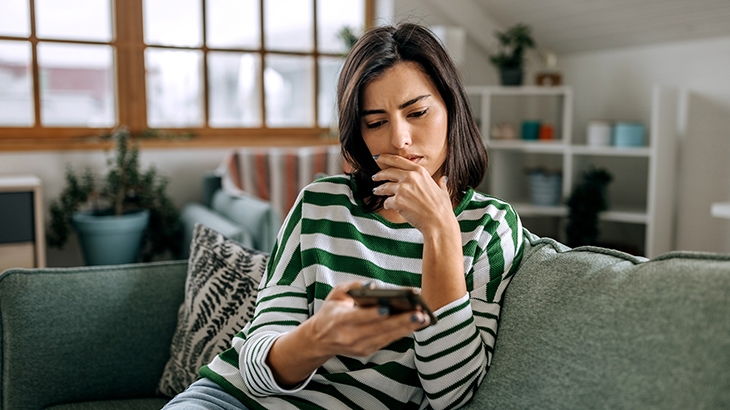Scams: What Your Bank Will Never Ask You For
People fall for scams every day. You might have seen a scam today (fake toll bills or a "lost package"), but do you know what your bank will never ask you for? With so much fraud happening, it may not be a surprise to get a phone call, text, or email telling you about fraud on your accounts that's supposedly from your bank. Protect yourself from THOSE scams by knowing the signs and what your bank will never ask you for.

Things Banks Never Ask For or Do
If you get a message, email, or call claiming to be from your bank and they ask for this information, don't respond and report it immediately to your bank. This way, they can gather information to try to prevent fraud from happening to other people and potentially report the efforts to law enforcement. Examples of things your bank will never ask you for include:
- Online banking username or password
- Answers to online banking security questions
- Debit card PIN
- One-time passcodes
- The three digit code on the back of your debit or credit card
- To verify any account information over the phone or through email
- Access to your computer
- To transfer money to an unknown account for any reason
- To assist the bank with an investigation (they may ask for basic information about the transaction to file the report and conduct the investigation)
- Download unverified applications, software, or strange attachments
- To be dishonest or keep a secret from bank employees
How to Stay Safe from Scams: Phishing Red Flags
If you get any message or call asking for one or more of the above, it's most likely a scam, no matter how fraudsters get ahold of you. There are also specific signs for texts, emails, and phone calls to look out for and things not to do:
- Text Message
- It comes from a strange phone number—generally, banks only send texts from six digit numbers; if it looks like a personal phone number, it's probably a scam
- A link is included (do not click!)
- Incorrect contact information is provided (use the info on the back of your debit card)
- An old bank name is referenced (for WaFd Bank, that's Washington Federal)
- Use of urgent or fear-inducing language (there's fraud on your account, ACT NOW)
- Request for personal info like PINs, passwords, or Social Security Numbers
- They send an attachment (do not open it!)
- The bank logo looks distorted
- An old bank name is referenced (for WaFd Bank, that's Washington Federal)
- It comes from a strange email address; look for misspellings that are easy to miss, like a missing letter
- Incorrect contact information is provided (use the info on the back of your debit card)
- Use of urgent or fear-inducing language (there's fraud on your account, ACT NOW)
- Request for personal info like PINs, passwords, or Social Security Numbers
- Phone Call
- Don't rely on caller ID—phone numbers can be spoofed, which means it looks like they are calling from the right number, but they are not
- You're pressured to log into or send money with payment apps or gift cards
- Use of urgent or fear-inducing language (there's fraud on your account, ACT NOW)
- You're asked to verify your full account number
- You are told not to tell your banker about the phone call
WaFd Bank also offers a scam checker through our partnership with Banzai! to help if you can't get ahold of someone immediately. We recommend reviewing the questions before a scam happens so you're more prepared to spot it when (not if) you're presented with one.
Double Check with Your Bank Before Doing Anything
If it's really your bank calling, they will understand that you want to be sure the situation is legitimate. Hang up (or don't respond to the text or email) and call your bank using the phone number on the back of your debit card to ask about the call or message you received. They can then verify whether the message is fraudulent or legitimate.
When Would a Bank Call You
Your bank may contact you to ask about suspicious activity, such as potentially fraudulent debit card transactions, or verify a check you may have written. When they call, the representative will share the reason for the call and may ask for identifying information, such as your full name and address or a security phrase for your accounts, if you've set one. Your bank will not ask to verify your full account number, debit card, CVV code or PIN, and other information listed above.
Banks understand the need for security, so let them know you'll call customer service to verify the call is legitimate, hang up, and call them back. This is an easy way to ensure you don't fall for those types of scams and helps keep your accounts secure. If you're near a branch, consider visiting in person to ask about your accounts, how you might be contacted in the future for fraudulent transactions, and what specific phone number or email those messages will come from. This way, you can save the information on your phone. This can be via a notes app or by creating a contact for your bank with any pertinent information saved in the contact as a note to make it easy to access so you can double-check when you get suspicious messages to verify legitimacy.
What to Do if You Fall for a Scam
First, don't feel bad about what happened, and move forward knowing you've learned a thing or two! Contact your bank by visiting the branch or calling the number on the back of your debit card and explaining what happened. Change your password for any accounts you suspect may have been affected. If you lose money, file a police report with your local police station in person or online.
How to Report Scams
Whether you've been a victim of a scam or you've spotted it before becoming a victim, always report scams to your bank (if they are being impersonated) and the Federal Trade Commission.
If you get a suspicious message that claims to be from WaFd Bank, please forward the message to your banker or call us at 800-324-9375 to report it. Any information you report can help the bank prevent others from falling victim and can help law enforcement bring fraudsters to justice before they get a chance to take advantage of someone else.
WaFd Bank is Here to Help
No question is too small for our friendly bankers, and we want to help you make the best financial decisions possible. Not only do we offer *Free Checking and have some great rates on savings accounts and CDs, but we also like to get to know you personally so we can offer the best assistance possible. To open an account or to ask us a question, give us a call at 800-324-9375 or visit your local branch today!
*Nonsufficient funds charge may apply.
Did you find this article helpful? Share it!


